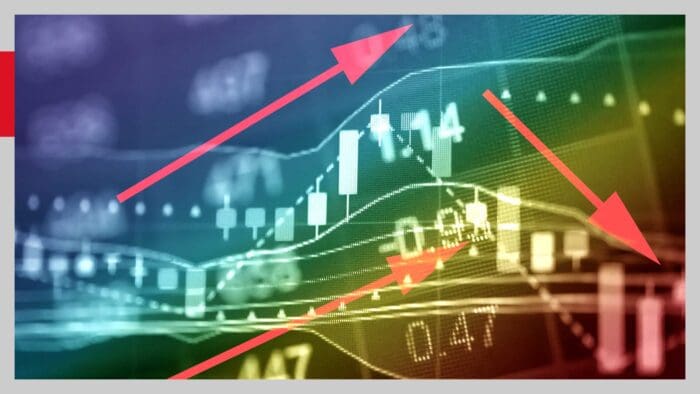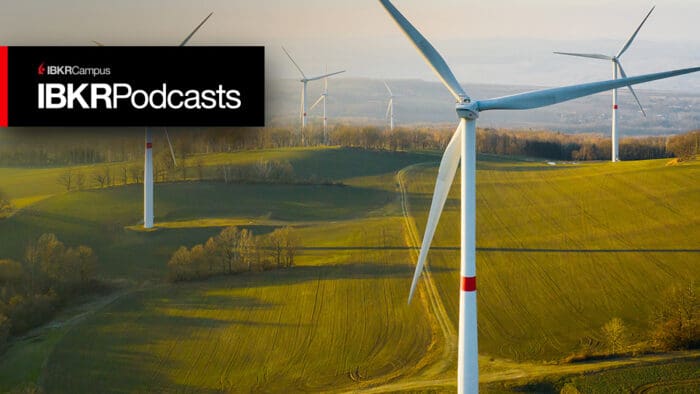Despite its loss of weighting within the broader S&P 500 index, the energy sector remains a source of ballast within investors’ portfolios. Direxion’s Ed Egilinsky discusses the prospects for energy during this election year.
Summary – IBKR Podcasts Ep. 148
The following is a summary of a live audio recording and may contain errors in spelling or grammar. Although IBKR has edited for clarity no material changes have been made.
Andrew Wilkinson
Welcome to this week’s podcast in which we’re going to discuss the US energy markets and my guest for this episode is Edward Egilinski, Managing Director and Head of Sales and Distribution at Direxion in New York. Welcome, Ed.
Edward Egilinsky
Thanks for having me, Andrew. Appreciate it.
Andrew Wilkinson
So tell us, Ed, how has the energy sector’s relevance, the size of it, shifted overtime within the S&P 500 index?
Edward Egilinsky
Certainly there’s been a big shift in the reduction of what the energy sector’s weighting represents in the S&P 500. Just for context, at its peak, the energy sector represented about 14% of the S&P 500. Currently, it’s a little less than 4%.
Historically, the energy sector has had about an 8% weighting within the S&P 500. When you look at the space, the energy sector, there continues to be a consolidation in the space that might represent more opportunity in terms of mergers and acquisitions, for example. And it’s reflected in the basket of stocks, energy stocks, that make up the S&P 500 now, along with the reduction in the weighting.
The number of energy stocks over the last 10 years that comprised of the S&P 500 have roughly been cut in half. However, it does pack a big punch energy maybe above its weight. No pun intended. The energy sector, representing about 4% of the S&P 500 now. However, earnings within the S&P 500 accounts for about 9% of the total earnings.
Andrew Wilkinson
2021, I think energy returns were about 53% and 2022 they’re about 64%.
I think year to date the Energy Index itself was up about 5%, as well as the oil and gas exploration products, right?
Edward Egilinsky
Yeah, there’s two major benchmarks in the energy space. One is the Energy Select Sector Index and that comprises of the basket of stocks within the energy complex that are part of the S&P 500.
And then there’s more of the, if you want to get more granular, the S&P Oil & Gas Exploration & Production Index. There’s some overlap there, but that’s more of the oil and gas stocks that make up the S&P. And as you mentioned this year, the energy stocks are up for the year. Crude oil is up, but there’s been a major divergence in terms of natural gas. The commodity itself is down significantly. While it’s comparable energy, oil and gas baskets are up for the year in terms of stocks.
Andrew Wilkinson
Now it’s also a U.S. presidential election year. We can’t get away from that, Ed. How might this impact other than energy related stocks in 2024?
Edward Egilinsky
Well, whatever side of the fence you are on, there are definitely differing policies on energy depending on the party. And the current administration, it is an election year, they would probably like to keep energy prices in check, inflation in check.
So as a result of that, a lot of people may not know that the US has had record output of oil and gas over the last year.
But what’s interesting is despite that, the current administration has rejected recently some new LNG pipeline licenses. So there’s a continued focus on alternative energy, but at the same time, there’s still a heavy dependence on fossil fuel.
Andrew Wilkinson
What about some of the potential unintended consequences of the global green energy initiatives and the shift from fossil fuels?
Edward Egilinsky
Well, I think everybody’s in agreement. We want cleaner air from a global perspective, but that comes at a little bit of a price short term, as a result of the lack of CapEx spending on energy infrastructure.
So there is a question if fossil fuel continues to be the dominant source of energy over the next couple of years, will we be able to keep up with future demand as a result of that lack of CapEx spending on infrastructure?
Now you do have some alternative energy initiatives that have started already. Solar and wind, but keep in mind that’s really dependent on Mother Nature. So those can’t really be the two main sources of energy options or alternative energy options because of the fickleness of the weather.
It’s interesting. EVs have come up a lot lately. No doubt that they’re additive to that clean energy initiative, but as a result of what happened just a couple of weeks ago with the cold weather and the inability, in some cases, for the EVs to hold their battery charge, you’re seeing a little bit of a change with some automakers shifting more to a hybrid type of approach.
But we’ll see. EVs are here to stay, but maybe there’s going to be a little more broadening out of having more of a hybrid type of car.
Andrew Wilkinson
What are your thoughts on the latest US moratorium on liquid natural gas exports and will it have a ripple effect on natural gas?
Edward Egilinsky
Yes, definitely potentially especially with Europe because there is much more reliance on the US today as a result of the Ukraine Russia war.
Previous to the Ukraine-Russia conflict, Russia was the largest exporter to Europe of natural gas. Natural gas is very volatile. We touched on this a little bit at the beginning. It was up as much as 20% in January at one point. Now it’s down about that, year to date. Part of that could be due to the fact that it’s very reliant on weather and seasonality. They’re still the biggest drivers of natural gas and it’s been a little bit more of a of a milder winter.
Andrew Wilkinson
You mentioned Ukraine and Russia are in there, but what about other big geopolitical catalysts? What have we got to watch out for this year as far as the energy market’s concerned?
Edward Egilinsky
There’s a significant portion of the population and GDP Countries that have elections this year outside of the United States.
Andrew Wilkinson
Global population is about 3 1/2 billion that’s going through an election this year, right?
Edward Egilinsky
Yeah. So it’s sizable and it’s involving a number of countries that, of course, impact energy specifically, as well.
And some indirectly related that are heavy consumers of energy. So that’s important from a political standpoint, including outside the United States. Also the unfortunate situation that there seems to be more global conflict around the world than anytime since World War 2. Hopefully that will start to change and dissipate.
And when it comes to specifically related to oil, two areas. One is the Red Sea, as a result of the Iranians and the Houthis. The impact on transportation. That’s a big hub, of course for different commodities being transported from that area.
And then as I mentioned, the Ukraine-Russia conflict creating instability within the Black Sea. Another vital area there as well. And then you have the ongoing China-US relations that you have to always be cognizant on, as China is the biggest importer of oil.
And then you have the sanctions currently on Russia, Venezuela and Iran. What if those thought to free up a little bit. Or it’s not as restrictive, then there’ll be more oil in the market.
But still Andrew, the biggest unknown or the biggest variable is OPEC+. They just extended their production cuts through the end of June. How committed are they? How long will they continue to keep these cuts as the year continues to go on? Especially if China’s demand doesn’t improve significantly relative to where it is today.
Andrew Wilkinson
Ed, talk about that. How instrumental is the Chinese economic recovery in driving ongoing oil demand?
Edward Egilinsky
It’s definitely a factor, but what’s interesting is crude oil rose last year and the Chinese economy continued to be very sluggish. One of the keys I think for China is going to be additional government stimulus that could help drive demand. But also when you look at China, if we cut rates here and we’re not determining yet how many rate cuts. But once we start to get rate cuts here, I think it might help overall and that could include China.
One other emerging market, Andrew, I’ll mention is India. Largest population right now. Their middle class continues to increase in terms of numbers. That could help supplement maybe some of the loss in demand that we’re seeing in China.
Andrew Wilkinson
Talk a little bit about energy-related stocks versus the actual underlying commodity, Ed.
Edward Egilinsky
Yeah, we touched on that a little bit at the beginning of the segment. Physical commodities can and do behave differently than energy related equities. And the correlation of energy stocks to the physical commodity itself is .5 or less over time.
Now when you’re diversifying a portfolio, you may want to look to the physical commodity itself, whether a broad basket or individual commodities like gold. Because they’re a distinct asset class and they represent possibly more of a portfolio diversifier. That was the case in 2022, both from broad commodity benchmarks, as well as the energy sector as you alluded to.
When you look at natural resource stocks, they’re, of course, naturally more correlated to the broader equity markets. And when you look at energy stocks, they’re impacted by other factors beyond the underlying commodity price, such as the company’s individual balance sheet and whether or not they’re hedging their exposure of the commodity itself.
Andrew Wilkinson
And Ed, what are some of the different investment options to trade in the energy space that investors fa ce?
Edward Egilinsky
Well, definitely you can invest in a broad basket of energy stocks, whether it’s through the S&P Energy Select Sector Index or the Oil & Gas or the S&P Oil & Gas Exploration and Production Index.
But those you could look at as diversifiers within the overall equity allocation. When you look at the oil and gas stocks, they tend to have a little more volatility than the broader Energy Select Sector Index.
So your investors should keep that in mind. And those that want a short-term trading view and have a bullish or bearish view on energy stocks may want to look at such trading instruments as leverage and inverse ETFs. But those would be very short-term trades for active traders.
And if somebody wanted more of the pure commodity play, there are a number of ways you can invest in that through a broad commodity basket, through an ETF, mutual fund, etc,, that might include energy and other commodity sectors as well.
Or on an individual commodity basis, whether it’s crude oil, natural gas, or if you go outside of the energy sector to the metals, for example. Probably the most popular is gold or silver. But one of the things to be cognizant of when you’re investing in any commodity that is using Futures, you want to be aware of how are they handling the Roll Yield when they’re rolling positions because Futures have to be rolled periodically. They have expiration dates to them.
And there’s something called Contango and Backwardation that any investor should be aware of when they’re considering an investment in any of the commodities that use Futures.
And what I mean by that is Contango, you’re rolling into higher prices and if you’re long something, that could tend to have a negative impact on your return overtime. And most of the time, commodities are in some level of what’s called Contango or rolling into higher prices.
What’s ideal is if something is rolling into prices that are cheaper, known as Backwardation. Backwardation tends to occur when there’s more demand than supply and that’s happening in some of the Energy Futures right now, including crude oil.
But one of the things that you want to make yourself aware of before investing in pure commodities is that do they have a smart roll yield? How are they handling the roll of the futures? And that could impact your return one way or the other.
Andrew Wilkinson
Ed Egilinsky, MD and Head of Sales and Distribution at Direxion in New York. Thank you very much for your time today. And please remember folks to rate our recent podcasts whever you download your podcasts from. And look out for more episodes at IBKR podcasts.
Disclosure: Interactive Brokers
The analysis in this material is provided for information only and is not and should not be construed as an offer to sell or the solicitation of an offer to buy any security. To the extent that this material discusses general market activity, industry or sector trends or other broad-based economic or political conditions, it should not be construed as research or investment advice. To the extent that it includes references to specific securities, commodities, currencies, or other instruments, those references do not constitute a recommendation by IBKR to buy, sell or hold such investments. This material does not and is not intended to take into account the particular financial conditions, investment objectives or requirements of individual customers. Before acting on this material, you should consider whether it is suitable for your particular circumstances and, as necessary, seek professional advice.
The views and opinions expressed herein are those of the author and do not necessarily reflect the views of Interactive Brokers, its affiliates, or its employees.
Disclosure: Mutual Funds
Mutual Funds are investments that pool the funds of investors to purchase a range of securities to meet specified objectives, such as growth, income or both. Investors are reminded to consider the various objectives, fees, and other risks associated with investing in Mutual Funds. Please read the prospectus accordingly. This communication is not to be construed as a recommendation, solicitation or promotion of any specific fund, or family of funds. Interactive Brokers may receive compensation from fund companies in connection with purchases and holdings of mutual fund shares. Such compensation is paid out of the funds' assets. However, IBKR does not solicit you to invest in specific funds and does not recommend specific funds or any other products to you. For additional information please visit https://www.interactivebrokers.com/en/index.php?f=1563&p=mf
Disclosure: Futures Trading
Futures are not suitable for all investors. The amount you may lose may be greater than your initial investment. Before trading futures, please read the CFTC Risk Disclosure. A copy and additional information are available at ibkr.com.
Disclosure: ETFs
Any discussion or mention of an ETF is not to be construed as recommendation, promotion or solicitation. All investors should review and consider associated investment risks, charges and expenses of the investment company or fund prior to investing. Before acting on this material, you should consider whether it is suitable for your particular circumstances and, as necessary, seek professional advice.
Disclosure: Complex or Leveraged Exchange-Traded Products
Complex or Leveraged Exchange-Traded Products are complicated instruments that should only be used by sophisticated investors who fully understand the terms, investment strategy, and risks associated with the products. Learn more about the risks here: https://gdcdyn.interactivebrokers.com/Universal/servlet/Registration_v2.formSampleView?formdb=4155



















Join The Conversation
If you have a general question, it may already be covered in our FAQs. If you have an account-specific question or concern, please reach out to Client Services.